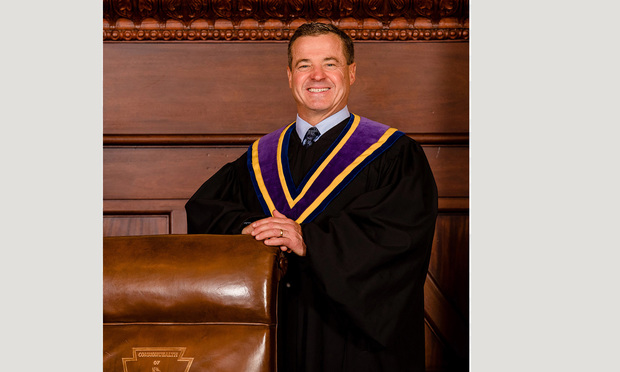Pa. Justices Refuse to Reconsider Statute of Repose Ruling, Sparking Stinging Dissent From Wecht
Justice David Wecht did not agree with the court's decision denying reconsideration and issued a strongly worded statement dissenting to the court's order.
February 06, 2020 at 03:10 PM
5 minute read
 Pennsylvania Supreme Court Justice David Wecht.
Pennsylvania Supreme Court Justice David Wecht.
The Pennsylvania Supreme Court has declined to reconsider a case that last year resulted in the court striking down MCARE's statute of repose, and at least one justice is not happy about that decision.
Late last month, the Supreme Court denied nonprofit health care provider UPMC's request to have the court reconsider its October ruling in Yanakos v. UPMC, a highly anticipated decision that resulted in a sharply divided court striking down the seven-year limitation on bringing medical malpractice lawsuits. The decision not to rehear the case leaves in place the court's determination that the Medical Care Availability and Reduction of Error (MCARE) Act's statute of repose violated the Pennsylvania Constitution's guarantee of open access to the courts.
Justice David Wecht, however, did not agree with the court's decision denying reconsideration and issued a strongly worded statement dissenting to the court's order.
"The filing before us illustrates that the decision in Yanakos was not just incorrect, but was confused as well. Confused about the law. Confused about procedure. Confused about insurance. Confused about the questions presented," Wecht said, noting that the American Medical Association, the National Federation of Independent Business, the Pennsylvania Medical Society and the majority caucuses in both the Pennsylvania House and Senate had joined the petition for reconsideration. "Reargument is a fail-safe. It gives an appellate court the opportunity to admit that it made a mistake. This court should have taken advantage of that opportunity today."
According to the docket, Chief Justice Thomas Saylor also noted his dissent to the reargument denial.
READ THE STATEMENT:
Yanakos stemmed from an organ donation, where a woman was implanted with a portion of her son's liver. Years after the procedure, the organ began to fail, and it was eventually found that the donor had undergone a test before the transplant revealing that his liver had not been functioning properly.
After the justices agreed to consider whether MCARE's statute of repose arbitrarily and capriciously deprived some patients of their access to court, the plaintiffs focused their arguments on the statute of repose's foreign-object exception, which, they argued, showed that the act made arbitrary distinctions.
In the court's 20-page opinion, Justice Sallie Updyke Mundy said the defendants in the case needed to show that the General Assembly's enactment of the MCARE Act's statute of repose was "substantially or closely related to an important government interest." However, Mundy said the defendants failed to meet that burden.
"There was no evidence to show the initially proposed four-year statute of repose would provide actuarial certainty, except that it 'seemed like a reasonable resolution' to 'provide some stability and predictability' to insurers," Mundy said, citing the legislative history in first proposing a four-year statute of repose. "There is no evidence in the legislative history as to how the General Assembly arrived at a seven-year statute of repose with exceptions for foreign objects cases and minors. The legislature did not cite any statistics on the number of medical malpractice actions that are commenced after seven years of the occurrence giving rise to the action. There is no indication that such a time period, as opposed to a longer or shorter period, will have any effect on malpractice insurance costs."
Justices Debra Todd and Kevin Dougherty joined Mundy. Justice Christine Donohue concurred with the result, and Wecht filed a dissent that Saylor and Justice Max Baer joined.
In requesting to have the issue reconsidered, UPMC argued that the court's analysis "clashed" with recent precedent interpreting the same statute, improperly disregarded the General Assembly's policy objectives in enacting the act's statute of repose, and was based on an issue that was not before the court.
"The court's decision sets aside bedrock jurisprudential foundation for statutes of repose and replaces it with evidentiary quicksand upon which no legislature could erect a sound statute," UPMC's attorney, John Conti of Dickie, McCamey & Chilcote, said in the reargument petition.
Wecht's dissenting statement agreed that the central tenets of the court's eventual ruling had not been addressed by the parties, adding that on appeal the case "took on a life of its own."
"What began as a dispute about whether the legislature's exemption of foreign-object cases was arbitrary and unconstitutional was suddenly afforded a judicial resurrection as an appeal about 'whether the seven-year statute of repose is substantially related to controlling the cost of medical malpractice premium rates'—something that the Yanakoses had never argued and the lower courts had never considered," Wecht said.
Adding to that, Wecht said the court's decision "ignored precedent, misinterpreted the remedies clause of the Pennsylvania Constitution, and incorrectly adopted (and then misapplied) the intermediate scrutiny test." Wecht also said that, although the opinion determined the seven-year time period to be arbitrary, it appeared to be "starkly unaware" that the seven-year time frame correlated with state regulations on preserving medical records—an assertion that UPMC initially made.
Wecht's dissenting statement was not the first time he has criticized his fellow justices for what he's seen as the court diverging from precedent.
When the court issued its ruling in Yanakos in late October, he said the majority's standard for reviewing the issue was "contrary to our precedent" and "encroach[ed]" on the legislature. And at the beginning of 2019, Wecht also issued a dissent in the closely watched case Gallagher v. Geico in which he decried what he saw as the court "upending … well-established precedent" and supplanting its own judgment over that of the legislature.
Neither Conti, nor Patrick Cavanaugh of Del Sole Cavanaugh Stroyd, who represented the plaintiffs, returned a message seeking comment.
This content has been archived. It is available through our partners, LexisNexis® and Bloomberg Law.
To view this content, please continue to their sites.
Not a Lexis Subscriber?
Subscribe Now
Not a Bloomberg Law Subscriber?
Subscribe Now
NOT FOR REPRINT
© 2025 ALM Global, LLC, All Rights Reserved. Request academic re-use from www.copyright.com. All other uses, submit a request to [email protected]. For more information visit Asset & Logo Licensing.
You Might Like
View All
Superior Court Rejects Pa. Hospital's Challenge to $7.3M Med Mal Judgment
3 minute read
Longtime Reed Smith Health Care Partner Opts for Solo Practice Over Retirement
3 minute read
Pa. Appeals Court: Trial Judge Dismissed Med Mal Claims Without Giving Plaintiffs Proper Time to Fight Back
4 minute read
Pa. Hospital Agrees to $16M Settlement Following High Schooler's Improper Discharge
4 minute readLaw Firms Mentioned
Trending Stories
Who Got The Work
J. Brugh Lower of Gibbons has entered an appearance for industrial equipment supplier Devco Corporation in a pending trademark infringement lawsuit. The suit, accusing the defendant of selling knock-off Graco products, was filed Dec. 18 in New Jersey District Court by Rivkin Radler on behalf of Graco Inc. and Graco Minnesota. The case, assigned to U.S. District Judge Zahid N. Quraishi, is 3:24-cv-11294, Graco Inc. et al v. Devco Corporation.
Who Got The Work
Rebecca Maller-Stein and Kent A. Yalowitz of Arnold & Porter Kaye Scholer have entered their appearances for Hanaco Venture Capital and its executives, Lior Prosor and David Frankel, in a pending securities lawsuit. The action, filed on Dec. 24 in New York Southern District Court by Zell, Aron & Co. on behalf of Goldeneye Advisors, accuses the defendants of negligently and fraudulently managing the plaintiff's $1 million investment. The case, assigned to U.S. District Judge Vernon S. Broderick, is 1:24-cv-09918, Goldeneye Advisors, LLC v. Hanaco Venture Capital, Ltd. et al.
Who Got The Work
Attorneys from A&O Shearman has stepped in as defense counsel for Toronto-Dominion Bank and other defendants in a pending securities class action. The suit, filed Dec. 11 in New York Southern District Court by Bleichmar Fonti & Auld, accuses the defendants of concealing the bank's 'pervasive' deficiencies in regards to its compliance with the Bank Secrecy Act and the quality of its anti-money laundering controls. The case, assigned to U.S. District Judge Arun Subramanian, is 1:24-cv-09445, Gonzalez v. The Toronto-Dominion Bank et al.
Who Got The Work
Crown Castle International, a Pennsylvania company providing shared communications infrastructure, has turned to Luke D. Wolf of Gordon Rees Scully Mansukhani to fend off a pending breach-of-contract lawsuit. The court action, filed Nov. 25 in Michigan Eastern District Court by Hooper Hathaway PC on behalf of The Town Residences LLC, accuses Crown Castle of failing to transfer approximately $30,000 in utility payments from T-Mobile in breach of a roof-top lease and assignment agreement. The case, assigned to U.S. District Judge Susan K. Declercq, is 2:24-cv-13131, The Town Residences LLC v. T-Mobile US, Inc. et al.
Who Got The Work
Wilfred P. Coronato and Daniel M. Schwartz of McCarter & English have stepped in as defense counsel to Electrolux Home Products Inc. in a pending product liability lawsuit. The court action, filed Nov. 26 in New York Eastern District Court by Poulos Lopiccolo PC and Nagel Rice LLP on behalf of David Stern, alleges that the defendant's refrigerators’ drawers and shelving repeatedly break and fall apart within months after purchase. The case, assigned to U.S. District Judge Joan M. Azrack, is 2:24-cv-08204, Stern v. Electrolux Home Products, Inc.
Featured Firms
Law Offices of Gary Martin Hays & Associates, P.C.
(470) 294-1674
Law Offices of Mark E. Salomone
(857) 444-6468
Smith & Hassler
(713) 739-1250





